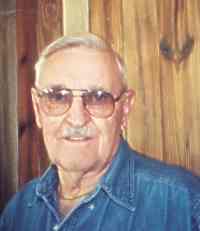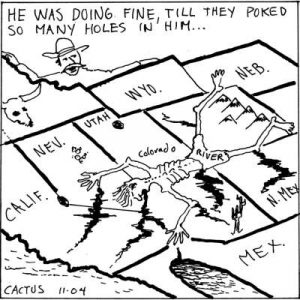Essay by John C. Mattingly
Politics – November 2004 – Colorado Central Magazine
IN THIS UPCOMING ELECTION, I’d like to give Adlai Stevenson my vote for President. Stevenson — the Democratic candidate for President in 1952 and 1956 — lost both times to Ike Eisenhower and then lost to Kennedy in the Democratic presidential primaries in 1960.
Stevenson was a loser, and he’s dead, but looking at the current federal administration, this should be no obstacle to his candidacy.
Bush turned a losing count into a winning ticket, and our U.S. Attorney General, John Ashcroft, is living proof that there are times when the best man for the job is a dead man.
And don’t forget that a dead man should be able to garner the Deceased Vote. Deceased Americans are the largest untapped voter pool of all time, and growing every day.
So why do I really want to vote for Adlai Stevenson? The answer has two parts.
First, Stevenson gets my vote for being a statesmen instead of a spin doctor, a thinker rather than an actor, and a man of thrift rather than indulgence. When was the last time a politician said something on a caliber with what Stevenson said in his 1952 campaign? “Eggheads unite, all you have to lose is your yolks.” And then there was that memorable quote when he lost the 1956 election, “It hurts too much to laugh and I’m too much a man to cry.”
Also, you can’t help but notice that after Stevenson lost out to Kennedy in the 1960 Democratic primary, the United States spun out of control. We had too much television in every home, a missile crisis that nearly blew us up, we watched one assassination after another, we lost a war in Vietnam, and saw riots in the streets. We went off the gold standard, we had a President resign from office, we endured drugs, coverups, and boneheads. We had embargoes, and hostages, then Hollywood in the White House — and it didn’t get any better from there. Whatever centripetal force had held things together lost its grip when Stevenson lost to Kennedy.
My father said it all, “If Stevenson had been elected President, they would not have shot him. Everything would be different.”
Of course, everything isn’t different, and that brings up the second part of why I want to vote for Stevenson: I advocate a new and different balloting format in which a vote for Stevenson would not be a wasted vote. We might call it Pro-Choice Voting. It would work like this:
A registered voter can cast a first, second, and third choice for each national office. The voter is not required to cast a second and third choice, but has the option to do so. Nor is a voter required to cast a first place vote. Casting only a third place vote, for example, is also a choice. In my case, my first choice for President is Adlai Stevenson, my second and third choices would come from the candidates currently promoted by the two party system.
THE MECHANICS OF Pro-Choice Voting, enabled by computers, would count each first place vote as one, each second place vote as one-half, each third place vote as one-third. A candidate could win with a preponderance of partial votes. For example, if most people do as I would, casting their first place vote for their favorite dead statesman and their second place vote for Kerry or Bush, the winner would be the one with the most half-votes. While the headline would read VICTORY, the subtext would read BUT NO MANDATE. This might be called, “Winning by a Partial Vote Election.”
In the current system, a candidate can win the election with a preponderance of ballots from those voting for the lesser of two evils, and that candidate might infer a false sense of confidence in his or her performance or promises. That could cause the politician to lead the nation off in an unpopular direction. With Pro-Choice Voting, the victor in an election gets numerical feedback from the electorate. Winning by Partial-Vote Election confers less confidence on the victor than winning by Full Vote Election.
People might oppose Pro-Choice Voting for a couple of reasons. First, they might argue that it would increase the chances of a national candidate being elected with less than a majority of the vote. Well, in the current system, we’ve had that very outcome twice in the last three presidential elections. Clinton in 1992, and Bush in 2000 were both elected with less than 50% of the vote. Pro-Choice Voting wouldn’t create more opportunities for minority outcomes than already exist.
SECOND, PEOPLE might oppose the complexity of Pro-Choice Voting because they don’t trust computers to do the tabulations. While this is a valid concern, it betrays a misunderstanding of the actual risks involved. Electronic impulses actually have the potential for greater accuracy than chads and dimples on cards. And let’s face it, we trust computers with our finances, medical prescriptions, food blending and labeling, security systems, airplane controls, and automobile design. And the list goes on. To be concerned about voting machines in this era of computer dependency seems as hollowly discerning as expressing concern over a pea felt beneath forty mattresses.
And finally, people might have strong feelings against the outcome in a Partial Vote Election, arguing that a vote begins at the moment of perception. To adulterate the vote at this incunabular stage with multiple choice dilutions, effectively kills it.
In response, the pro Partial Vote Election advocates would point to all the unwanted politicians in dysfunctional government positions.
At the end of the day, Pro-Choice Voting and Partial Vote Elections would enable a much needed feedback loop between voters and leaders, and give voters a chance to choose between the greater of two goods. Three, actually.
It’s too late for this year, but I have heard a surprising number of people say that they are motivated to vote this year for the first time since registering — or that they are registering for the first time. So this is a good year to think about future changes, not only to the policy direction of the nation, but to the voting system that needs to eliminate the greater of two evils.
John Mattingly farms and writes in the San Luis Valley.



